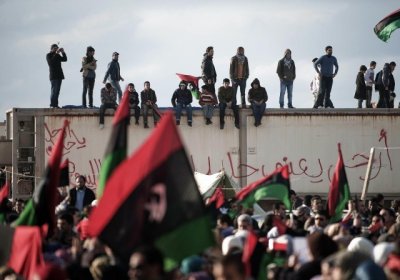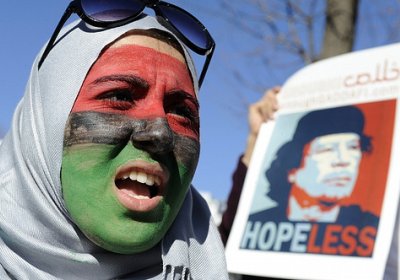On March 25, much of the community in Maharlika Village in Manila turned out after Friday prayers to protest against the Western powers’ military attacks against Libya.
Maharlika Village is a predominantly Moro community in Taguig City, in the south-east of Metro Manila. The protest was organised by the local council, community leaders, religious leaders from the community’s 16 mosques, the Bangsamoro Solidarity Movement and the Anak Mindanao Party (Amin).
Libya
The United Nations Security Council voted on March 19 to approve a military intervention into Libya, with 10 votes in favour and five absentions. It was presented as a response to calls from besieged rebels fighting the Muammar Gaddafi dictatorship for a “no-fly zone” to protect them, especially in the rebel stronghold of Benghazi.
Power worship is what the corporate media does best, and there has been plenty of that on display in recent Libya coverage.
Donning his “white man’s burden” hat, Peter Hartcher, in the March 22 Sydney Morning Herald, responded to the United States/European Union bombing by saying: “To the relief of millions in Libya and millions more around the world, the West has unsheathed the sword against [Gaddafi’s] resurgent forces.”
Such comments are the background noise that has lent a veneer of legitimacy to the West’s imperialist adventures since the end of the Cold War.
On March 17, the United Nations Security Council (UNSC) “effectively authorized the use of force in Libya”, the UN News Center said that day.
“Acting under Chapter VII of the UN Charter, which provides for the use of force if needed,” the report said, “the Council adopted a resolution by 10 votes to zero, with five abstentions, authorizing Member States ‘to take all necessary measures … to protect civilians and civilian populated areas under threat of attack in the Libyan Arab Jamhariya, including Benghazi, while excluding an occupation force.’”
Saif al-Islam, the billionaire son of Muammar Gaddafi who was the neoliberal darling of Western governments until only recently, boasted in a March 10 interview with Reuters that forces loyal to his family were now on the offensive against rebel forces.
NATO, for its part, has decided against military intervention — for the time being.
However, France became the first government to recognise the rebel Interim Transitional National Council (ITNC) set up in Benghazi on March 5. AFP reported that French President Nicolas Sarkozy has also proposed “targeted air strikes” on Libya.
Squatters have taken over a mansion in London owned by the son of Libyan leader Muammar Gaddafi, AFP said on March 8.
The eight-bedroom house in Hampstead, north London, is owned by Seif al-Islam Gaddafi.
The article said: “Members of a campaign group called ‘Topple the Tyrants’ said they had occupied the mansion and wanted it transferred to the people of Libya.”
“The plush home, in a secluded, leafy close surrounded by some of Britain’s most expensive residential streets, boasts an indoor swimming pool, a sauna room and a cinema room.”
The regime of Muammar Gaddafi has escalated its violence against rebel forces seeking to bring it down.
On March 6, opponents of the regime were reported to be in control of several cities, especially in Libya’s east.
AlJazeera.net said on March 4 that anti-government protests in the capital, Tripoli, had been met with tear gas by security forces.
Opponents said Az Zawiyah, a town just 40 kilometres from Tripoli that is home to an oil refinery, was mostly under rebel control.
Stop the massacre in Libya! Power to the people
A February 26 statement by the Socialist Alliance in solidarity with the people's uprisings in Libya and the Arab world
* * *
The Socialist Alliance extends its full solidarity to the people of Libya now being brutally repressed for demanding an end to the corrupt and unjust regime of dictator Colonel Muammar Gaddafi.
About 200 people rallied in Brisbane's King George Square on February 25 to show solidarity with the people of Libya resisting the oppressive regime of Muammar Gaddafi. A banner proclaiming "Free Libya" was fixed to a wall, together with photos of victims of the Libyan military and police.
Placards carried by members of the Libyan community, many of them students, read "Stop using mercenaries to kill our people" and "Please help our country".
In 1987, I visited Libya as a journalist for the left-wing newspaper Direct Action. I visited Gaddafi’s bombed-out home — attacked by the United States one year earlier.
In the 1980s, the Gaddafi regime came under attack from the US government because it took an anti-imperialist line and gave financial and material aid to many national liberation movements at the time.
On February 22, Muammar Gaddafi boasted on state TV that the Libyan people were with him and that he was the Libyan revolution.
His comments came as his dwindling army of special guards and hired mercenaries tried to drown the popular revolution in blood.
AlJazeera.net reported on February 21 that civilians were strafed and bombed from helicopters and planes. Snipers with high-powered rifles fired into unarmed crowds.
About 200 members of the Libyan community and supporters held an angry protest at Sydney's Town Hall on February 22 to condemn the brutal massacres against pro-democracy protesters carried out by the regime of Muammar Gaddafi. Protesters chanted "Down, down Gaddafi!" and (in Arabic) "The people's voice must be heard!"
The rally was told the death toll in the crackdown, which has included military airplanes attacking protesters, had killed at least 500 people and injured more than 3000.
- Previous page
- Page 3
- Next page







